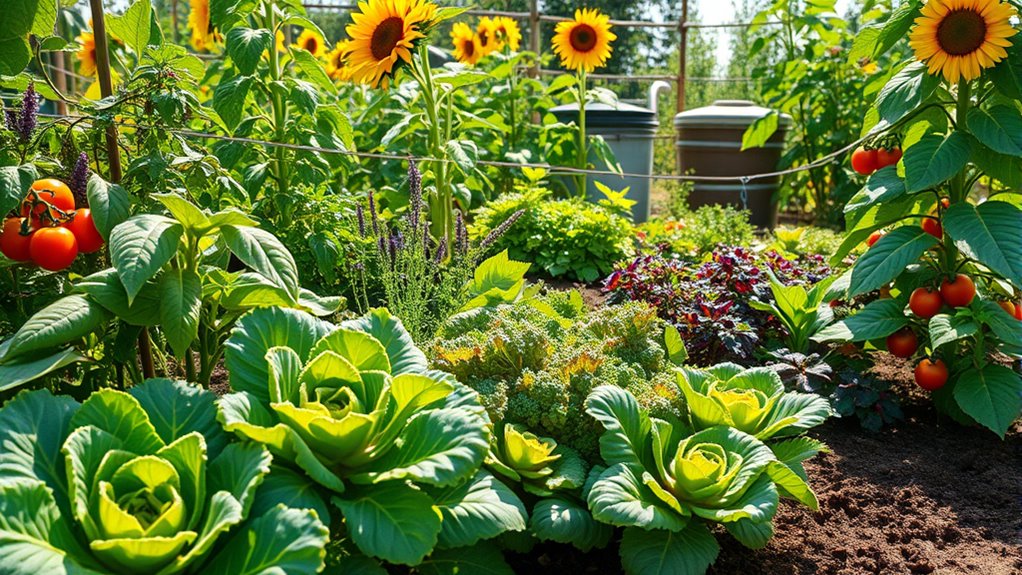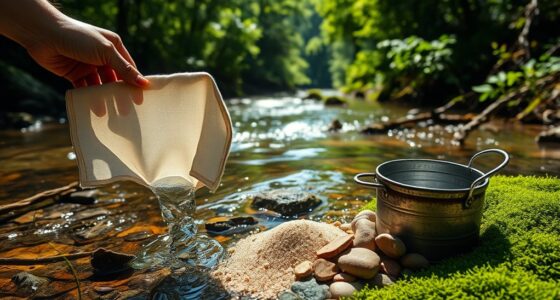To grow a survival garden for maximum nutrition, focus on companion planting skills like beans with corn and basil near tomatoes to boost yields and reduce pests. Improve soil health with organic compost and crop rotation, avoiding chemical fertilizers. Grow diverse crops, especially nutrient-dense greens, roots, and legumes, to guarantee balanced nutrition. Use organic pest control and maintain soil testing for ideal results. Keep tending your garden, and you’ll uncover more ways to strengthen its resilience.
Key Takeaways
- Implement companion planting, such as beans with corn and basil near tomatoes, to enhance nutrient uptake and pest resistance.
- Enrich soil with organic matter like compost and practice crop rotation to maintain soil fertility and structure.
- Grow nutrient-dense crops like leafy greens, legumes, and root vegetables for maximum vitamins and minerals.
- Promote plant diversity to attract beneficial insects, improve pollination, and reduce pest and crop failure risks.
- Use organic pest control methods and conduct regular plant inspections to protect crops without chemical pesticides.

Growing a survival garden is one of the most practical steps you can take to guarantee your food security during emergencies. When you start planning your garden, focus on strategies that maximize yield and nutrition while maintaining the health of your soil. One of the most effective techniques is companion planting, which involves growing certain plants together to support each other’s growth. For example, planting beans with corn not only boosts yields but also improves soil health by fixing nitrogen, reducing the need for synthetic fertilizers. Similarly, basil planted near tomatoes can repel pests, protecting your crops and reducing the need for chemical pesticides. By thoughtfully pairing plants, you create a resilient garden ecosystem that promotes maximum nutrition and minimizes maintenance.
Companion planting boosts yields, improves soil health, and creates a resilient, low-maintenance survival garden ecosystem.
Soil health plays a vital role in the success of your survival garden. Healthy soil provides better nutrient availability, promotes strong root development, and enhances plant resistance to pests and diseases. To improve soil health, start with organic matter such as compost or aged manure, which enriches the soil with essential nutrients and beneficial microorganisms. Avoid heavy use of chemical fertilizers, as they can degrade soil quality over time. Incorporate crop rotation and cover cropping into your planting schedule; these practices prevent soil depletion, suppress weeds, and add organic matter naturally. Maintaining proper soil moisture is equally important, so consider installing drip irrigation or soaker hoses to deliver water efficiently and prevent erosion. Additionally, practicing minimal disturbance to soil through no-till methods helps preserve soil structure and microbial life.
You should also pay attention to plant diversity. Growing a variety of vegetables, herbs, and even some fruits not only boosts the nutritional profile of your garden but also reduces the risk of total crop failure. Different plants attract different beneficial insects and pollinators, which help keep pests in check naturally. This biodiversity creates a more stable environment, ensuring you get a steady harvest of nutrient-rich food. Keep your plants healthy by regularly inspecting for pests and diseases, removing affected foliage promptly, and practicing organic pest control methods such as neem oil or insecticidal soap. Incorporating soil testing can help you better understand your soil’s specific nutrient needs and adjust your practices accordingly.
In addition to companion planting and soil management, consider growing nutrient-dense crops like leafy greens, legumes, and root vegetables. These foods pack a lot of vitamins, minerals, and calories into small spaces, making them ideal for a survival garden. By combining smart planting practices with attention to soil health, you establish a sustainable, productive garden that can sustain you during tough times. Remember, the key to a vital nutrition survival garden is ongoing care, thoughtful planning, and understanding how different plants and soil interact to create a resilient food source. Incorporating sustainable gardening practices ensures that your garden remains productive and environmentally friendly over time.
Frequently Asked Questions
What Are the Best Crops for Nutrient Density in a Survival Garden?
You should focus on nutrient-dense crops like perennial herbs and root vegetables in your survival garden. Perennial herbs such as oregano, thyme, and chives provide continuous harvests packed with vitamins and antioxidants. Root vegetables like carrots, beets, and sweet potatoes offer high-calorie, nutrient-rich options that store well. Incorporating these crops guarantees you get maximum nutrition and sustainability during tough times, making your garden both resilient and healthful.
How Can I Extend the Growing Season for Maximum Harvest?
Did you know that extending your growing season can boost your harvest by up to 50%? To achieve this, focus on season extension techniques like using cold frames, row covers, and hoop houses. Practice crop succession by planting quick-maturing crops after main harvests. These methods protect plants from frost, allowing you to grow and harvest nutritious crops longer, ensuring a steady food supply throughout the year.
What Soil Amendments Improve Nutrient Content for Survival Gardening?
You can improve your soil’s nutrient content by using composting techniques to create rich, organic matter. Incorporate organic fertilizers like composted manure or fish emulsion to boost essential nutrients naturally. These methods enhance soil fertility, promote healthy plant growth, and increase yields. Regularly amending your soil with compost and organic fertilizers guarantees your survival garden remains nutrient-dense, providing the maximum nutrition needed during challenging times.
How Do I Prevent Pests Without Synthetic Chemicals?
Think of your garden as a peaceful neighborhood where pests are unwelcome guests. To keep them out without synthetic chemicals, you can practice companion planting—pairing plants that naturally repel pests, like marigolds with tomatoes. Use natural repellents such as neem oil or garlic spray to deter bugs. These methods create a harmony that protects your crops, ensuring a healthy, thriving garden without harmful chemicals.
What Are Cost-Effective Ways to Start a Survival Garden?
To start a survival garden cost-effectively, focus on companion planting to naturally deter pests and improve yields, saving money on chemicals. Collect rainwater for irrigation, reducing water costs and promoting sustainable growth. Use recycled containers or seeds from your kitchen to cut expenses. Plan your garden thoughtfully to maximize space and productivity. These strategies help you develop a resilient, nutrient-rich garden without breaking the bank.
Conclusion
With a survival garden, you’re planting a fortress of nourishment, a lush sanctuary that sustains you through storms and sunshine alike. As each seed sprouts, it weaves a tapestry of resilience and self-reliance, turning your backyard into a fortress of flavor and health. Keep nurturing your garden with care and patience, and watch it grow into a vibrant haven that feeds both body and spirit. Your green thumb transforms you into a master of your own nourishing kingdom.










